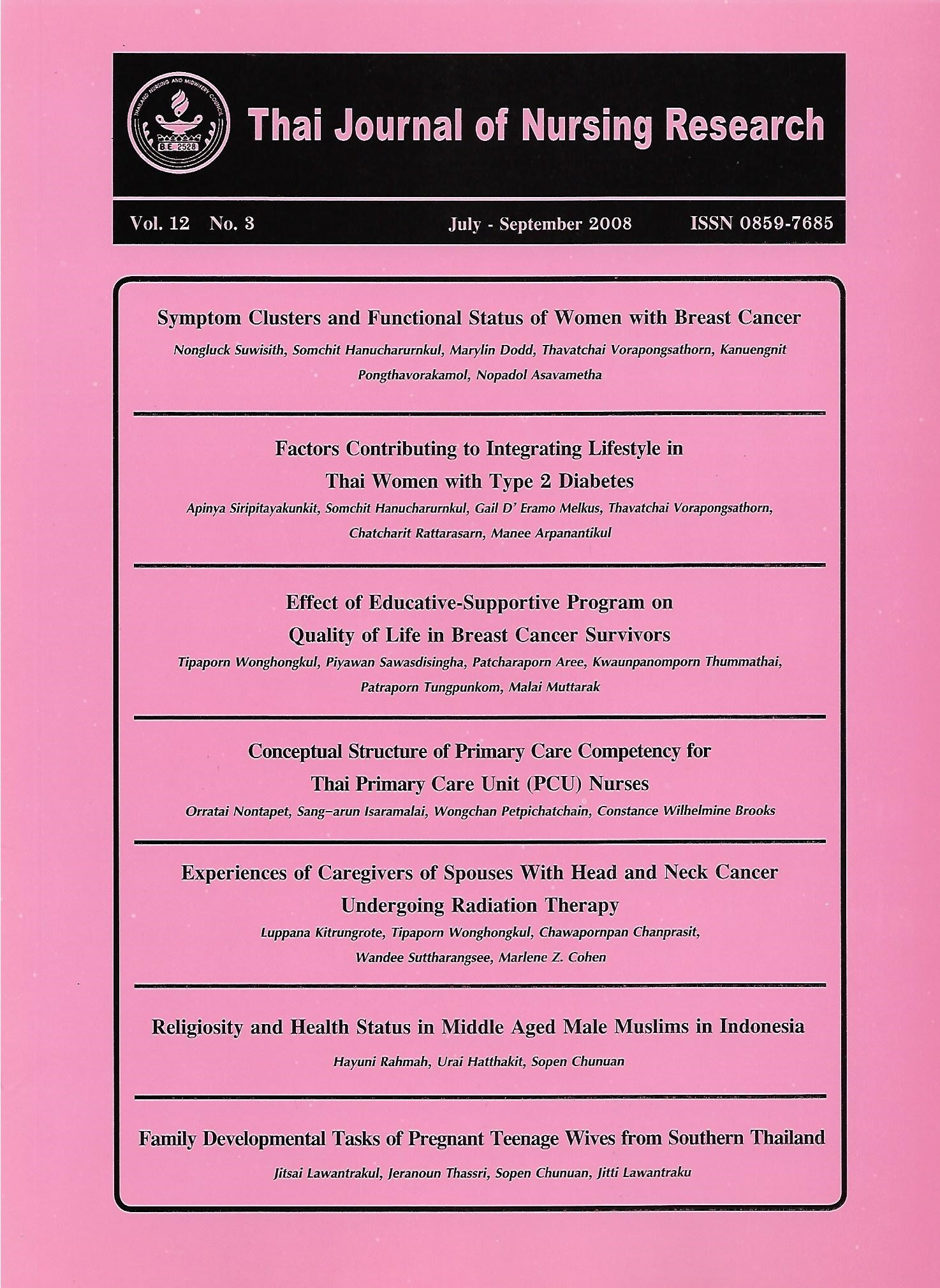Experiences of Caregivers of Spouses With Head and Neck Cancer Undergoing Radiation Therapy
Keywords:
ผู้ดูแล, คู่สมรส, มะเร็งศีรษะและคอ, รังสีรักษา, การวิจัยปรากฏการณ์นิยมเฮอร์เมนนิวติกAbstract
บทคัดย่อ
ในบริบทสังคมไทยการดูแลคู่สมรสถือว่าเป็นจารีตประเพณีสำคัญแต่ดั้งเดิม การดูแล อย่างต่อเนื่องดังกล่าวนี้อาจส่งผลกระทบต่อความผาสุกของคู่สมรสผู้ดูแล ปัจจุบันองค์ความรู้เกี่ยวกับประสบการณ์ของคู่สมรสผู้ดูแลผู้ป่วยมะเร็งศีรษะและคอขณะได้รับรังสีรักษาในประเทศไทยพบว่ายังมีการศึกษาไม่เพียงพอ การศึกษาครั้งนี้มีวัตถุประสงค์เพื่อบรรยายประสบการณ์ของคู่สมรสผู้ดูแลผู้ป่วย มะเร็งศีรษะและคอขณะได้รับรังสีรักษา คู่สมรสผู้ดูแลจำนวน 15 ราย (ภรรยาผู้ดูแล 12 รายและสามีผู้ดูแล 3 ราย) ถูกคัดเลือกจากหน่วยรังสีรักษาในโรงพยาบาลมหาวิทยาลัยแห่งหนึ่งในจังหวัดสงขลาระหว่าง พฤษภาคม ถึง ธันวาคม 2548 รวบรวมข้อมูลโดยการสัมภาษณ์แบบเจาะลึกและวิเคราะห์ข้อมูลโดยใช้วิธีวิจัยปรากฏการณ์นิยมเฮอร์เมนนิวติกของโคเฮน คานห์และสตีฟส์ (Cohen, Kahn, & Steeves) ผลการวิจัยพบว่าประสบการณ์ของคู่สมรสผู้ดูแลผู้ป่วยมะเร็งศีรษะและคอขณะได้รับรังสีรักษา ประกอบด้วย 6 ประเด็นหลัก คือ (1) พันธกิจต่อคู่ชีวิตเกิดจากพลังของความรัก ความใกล้ชิด ความไว้วางใจและการตอบแทนบุญคุณ (2) การส่งเสริมความสุขสบายของคู่ชีวิตแสดงออกโดยการดูแลสุขภาพกายให้แข็งแรงและบรรเทาอาการ รวมทั้งมีการให้กำลังใจ ความใกล้ชิดและความรักเมตตา (3) การเป็นผู้ร่วมทุกข์เกิดจากความรู้สึกไม่แน่นอนของชีวิตในอนาคต ความตึงเครียดที่เกิดจากการดูแล และความลำบากต่อการจัดการกับสภาพที่แปลกใหม่ของชีวิต (4) การปรับเปลี่ยนตนเองเป็นการปรับการดำเนินชีวิตและการคงไว้ซึ่งความหวังในการหายขาดจากโรคและการมีชีวิตยืนยาวของคู่ชีวิต ที่เจ็บป่วย (5) ความซาบซึ้งในการช่วยเหลือจากหลากหลายผู้คนและ (6) ความปิติยินดีกับการพัฒนา ตนเองและความสมบูรณ์ของชีวิตคู่สมรสเกิดจากการประสบความสำเร็จในการดูแล การเพิ่มพูนสัมพันธภาพระหว่างคู่สมรสและการพัฒนาความเข้าใจถึงสัจธรรมของชีวิต ผลของการศึกษาครั้งนี้ช่วยให้เจ้าหน้าที่สุขภาพได้ตระหนักถึงคู่สมรสผู้ดูแลเสมือนเป็นกลุ่มผู้ที่เปราะบางซึ่งต้องได้รับการดูแล และผลการศึกษาครั้งนี้เป็นนัยสำคัญพื้นฐานสำหรับงานวิจัยเกี่ยวกับการดูแลของคู่สมรสไทยในอนาคต
คำสำคัญ: ผู้ดูแล คู่สมรส มะเร็งศีรษะและคอ รังสีรักษา การวิจัยปรากฏการณ์นิยมเฮอร์เมนนิวติก
Abstract
Spousal caregiving is an important aspect of traditional Thai caregiving ideology. Evidence suggests that such continuous caregiving may affect the caregivers’ well-being. Presently, the knowledge of experiences of Thai spouses who are caregivers of persons with head and neck cancer undergoing radiation therapy is limited. The purpose of this study was to describe the experiences of spouses who care for persons with head and neck cancer undergoing radiation therapy. Fifteen spousal caregivers, consisting of 12 wife caregivers and 3 husband caregivers, were recruited from the Radiation Therapy Unit at the University Hospital in Songkhla province from May 2005 to December 2005. In-depth interviews were conducted, and data were analyzed using the hermeneutic phenomenological research approach described by Cohen, Kahn and Steeves. Six major themes emerged: (1) “Being committed for life to spouses” was rooted in the powers of love, intimacy, and trust, and led to repayment with gratitude, (2) “Enhancing the spouses’ comfort” was accomplished by strengthening their physical health and relieving symptoms and by giving them encouragement, intimacy and compassionate love , (3) “Being a co-sufferer” was due to the uncertainty of their future lives, the caregiving strain, and the difficulties with new living arrangements, (4) “Readjusting themselves” was through rearranging the caregivers’ life and holding onto hope for a cure and a longer life for their ill spouse, (5) “Appreciating peoples’ support”, and (6) “Being gratified with self-development and marital life growth” was derived from being successful caregivers, gaining a better marital relationship and developing insight into the truth of life. These findings can both help health professionals recognize spousal caregivers as a vulnerable group and care for them, and also pave the way for future Thai spousal caregiving research.
Keywords: Caregivers, Spouses, Head and Neck Cancer, Radiation Therapy, Hermeneutic Phenomenological Research
Downloads
How to Cite
Issue
Section
License
Copyright: The Pacific Rim International Journal of Nursing Research, Thailand Nursing & Midwifery Council has exclusive rights to publish, reproduce and distribute the manuscript and all contents therein.








.png)



